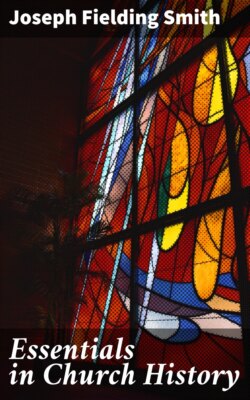Читать книгу Essentials in Church History - Joseph Fielding Smith - Страница 38
На сайте Литреса книга снята с продажи.
Power of the Clergy
ОглавлениеTable of Contents
Few outside of the clergy were educated enough to read and write; therefore priests became the lawyers, diplomats, ambassadors, instructors and prime ministers in the nations. All learned men talked and wrote in Latin, which was the language of Rome. It is said that for centuries a man convicted of a crime in England, by showing that he could read or write, could claim the benefits of a trial in the ecclesiastical court, which, “by long abuse came to mean exemption from the punishment of the criminal law of the land.”
Not only did the priests fill these important offices where they were enabled to wield great power and to control, very largely, the destinies of nations, but many of them became extremely avaricious and “divined for money.” Jean de Valdez, brother of the secretary to King Charles V, wrote of the times as follows: “I see that we can scarcely get anything from Christ’s ministers but for money; at baptism money, at bishoping money, at marriage money, for confession money—no, not extreme unction without money! They will ring no bells without money, no burial in Church without money; so that it seemeth that Paradise is shut up from them that have no money. The rich is buried in the Church, the poor in the church-yard. The rich may marry with his nearest kin, but the poor not so, albeit he be ready to die for love of her. The rich may eat flesh in Lent, but the poor may not, albeit fish perhaps be much dearer. The rich man may readily get large indulgences, but the poor none, because he wanteth money to pay for them” (Era of the Protestant Revolution, p. 60).
In addition to all this they taxed the people in various ways, receiving a tithing from all produce of the farms, a tenth of the land and of the wages of the working man. Writes Motley: “Not content, moreover, with their territories and their tithings, the churchmen perpetually devised new burdens upon the peasantry. Plows, sickles, horses, oxen, all implements of husbandry were taxed for the benefit of those who toiled not, but who gathered into barns.”
